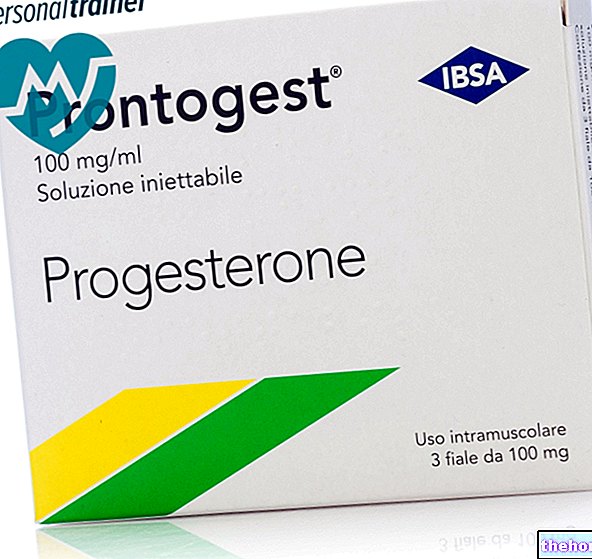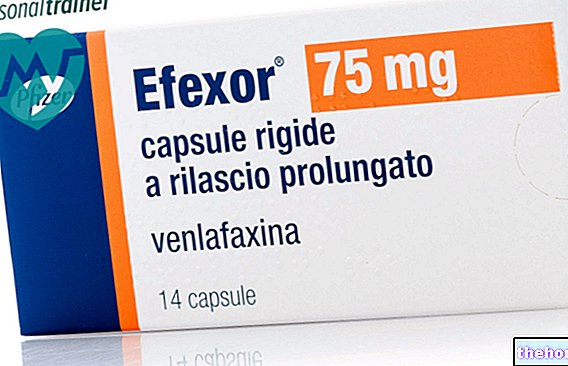Active ingredients: Potassium (Potassium chloride)
KCl-retard 600 mg prolonged-release tablets
Indications Why is KCl Retard used? What is it for?
KCl-retard contains an active substance called potassium chloride, which belongs to a class of medicines called mineral supplements.
KCl-retard is indicated to prevent and correct a potassium deficiency in the body, which generally manifests itself with a feeling of tiredness and muscle weakness (asthenia). KCl-retard is used in situations where your body is in a condition of potassium deficiency, in the event that:
- are undergoing prolonged or intense treatment with medicines called "diuretics", to treat hypertension (high blood pressure) and edema (swelling) of various kinds
- you are taking medicines called 'cardiotonic glycosides' to treat some heart conditions
- is undergoing administration of potassium-free solutions
- are being given high amounts of sodium salts (such as bicarbonate)
- are taking medicines called "corticosteroids" (medicines to treat inflammation / allergies)
- abuses laxatives
- has repeated vomiting
- have severe diarrhea
- suffer from gastric, intestinal or biliary fistula (when parts of the stomach, intestines, biliary tract that are normally separated come into contact)
- suffer from liver cirrhosis (severe chronic liver disease)
- suffer from adrenocortical hyperfunction (condition that generates hormonal changes)
- is subjected to stressful conditions such as major surgery and serious illness. Talk to your doctor if you don't feel better or if you feel worse.
Contraindications When KCl Retard should not be used
Do not take KCl-retard
- if you are allergic to potassium chloride or any of the other ingredients of this medicine (listed in section 6).
- if you suffer from severe impairment of kidney function (kidney failure)
- if you suffer from reduced urine output (oliguria)
- if you suffer from lack of urine output (anuria),
- if you suffer from increased nitrogen in the blood (azotemia)
- if you have hyperchloraemic acidosis (a condition in which the acidity of body fluids increases) accompanied by hypokalaemia (low levels of potassium in the blood)
- if you are being treated with a medicine called a 'carboanohydrase inhibitor' (medicine used to treat eye diseases)
- if you are in a state of acute dehydration (reduced amount of water in the body)
- if you suffer from hyperkalaemia (increased potassium in the blood)
- if you suffer from Addison's disease (a disease which causes a severe reduction in some hormones by destroying the gland that produces them).
Precautions for use What you need to know before taking KCl Retard
Talk to your doctor or pharmacist before taking KCl-retard.
The particular structure of the KCl-retard tablets has been designed to avoid the risk of stomach and intestinal irritation, however tell your doctor:
- if you suffer from compression of the esophagus (the organ that connects the pharynx to the stomach and carries food to the stomach) due to heart problems (left atrial dilation)
- if you suffer from obstruction of the digestive tract
- if you suffer from a slowing of the gastro-intestinal transit.
In addition, it is advisable to avoid:
- the simultaneous administration of potassium salts and medicines called "potassium-sparing diuretics" (group of medicines that work by increasing the amount of urine produced by the kidneys, such as aldosterone antagonists, triamterene, etc.), due to the risk of causing an increase in potassium in the blood.
In case of prolonged use, your doctor will check your blood potassium levels periodically, especially if you have heart or kidney disease.
Interactions Which drugs or foods can modify the effect of KCl Retard
Tell your doctor or pharmacist if you are taking, have recently taken or might take any other medicines.
No interactions are known so far.
KCL-retard with food and drink
Take KCl-retard tablets after meals (see section 3 "How to take KCl-retard").
Warnings It is important to know that:
Pregnancy and breastfeeding
If you are pregnant or breast-feeding, think you may be pregnant or are planning to have a baby, ask your doctor or pharmacist for advice before using this medicine. Use this medicine only when clearly needed and under the direct supervision of your doctor.
Driving and using machines
KCl-retard does not affect the ability to drive and use machines.
KCl-retard contains sucrose
If you have been told by your doctor that you have an intolerance to some sugars (eg sucrose), contact your doctor before taking this medicinal product.
Dosage and method of use How to use KCl Retard: Dosage
Always take this medicine exactly as your doctor or pharmacist has told you. If in doubt, consult your doctor or pharmacist.
Take KCl-retard tablets after meals. Take the tablets whole, without chewing them.
Adults
Generally, the recommended dose is 3-6 tablets per day; however, strictly follow the dose set by your doctor.
Overdose What to do if you have taken too much KCl Retard
If you take more KCl-retard than you should
If you accidentally take large amounts of this medicine, contact your doctor or the nearest hospital. In this case it is necessary to induce vomiting and perform a gastric lavage (to be carried out in hospital).
Your doctor may also give you a test called an electrocardiogram (ECG, a test to evaluate how your heart is working). In case of ECG changes, your doctor will check your potassium level in your blood and, if necessary, treat with an appropriate solution.
If you forget to take KCl-retard
Do not take a double dose to make up for a forgotten tablet.
If you stop taking KCl-retard.
If you have any further questions on the use of this medicine, ask your doctor or pharmacist.
Side Effects What are the side effects of KCl Retard
Like all medicines, this medicine can cause side effects, although not everybody gets them.
If during treatment with KCl-retard you have the following side effects, contact your doctor immediately, who will STOP the treatment with KCl-retard:
- severe vomiting
- bloating and pain in the belly
- stomach bleeding (loss of blood).
Other side effects that have been reported with other medicines containing the same active ingredient as KCl-retard (potassium chloride), and which therefore may also be potential side effects of KClretard, are:
Frequency not known (cannot be estimated from the available data)
- narrowing (stricture) of the small intestine (the first part of the intestine)
- intestinal ulcerations (lesions of the intestine)
Reporting of side effects
If you get any side effects, talk to your doctor. This includes any possible side effects not listed in this leaflet. You can also report side effects directly via the national reporting system at www.agenziafarmaco.gov.it/it/responsabili. By reporting side effects you can help provide more information on the safety of this medicine.
Expiry and Retention
Keep this medicine out of the sight and reach of children.
Do not store above 30 ° C. Protect the medicine from heat and moisture.
Do not take this medicine after the expiry date which is stated on the carton after EXP. The expiration date refers to the last day of that month.
Do not throw any medicines via wastewater or household waste. Ask your pharmacist how to throw away medicines you no longer use. This will help protect the environment.
Composition and pharmaceutical form
What does KCl-retard contain
- the active ingredient is: potassium chloride 600 mg
- the other components are: cetostearyl alcohol, gelatin, magnesium stearate, dried nebulized gum arabic, titanium dioxide, granulated sucrose (see paragraph "KCl-retard contains sucrose"), special purified talc, yellow iron oxide, red iron oxide, carnauba wax.
Description of the appearance of KCl-retard and contents of the pack
KCl-retard is presented in tablets of 600 mg, packed in blister packs of 40 tablets.
Source Package Leaflet: AIFA (Italian Medicines Agency). Content published in January 2016. The information present may not be up-to-date.
To have access to the most up-to-date version, it is advisable to access the AIFA (Italian Medicines Agency) website. Disclaimer and useful information.
01.0 NAME OF THE MEDICINAL PRODUCT
KCL-RETARD
02.0 QUALITATIVE AND QUANTITATIVE COMPOSITION
One prolonged-release tablet contains:
potassium chloride 600 mg (corresponding to 8 mEq of potassium ion).
03.0 PHARMACEUTICAL FORM
Prolonged-release tablets.
04.0 CLINICAL INFORMATION
04.1 Therapeutic indications
KCl-retard is indicated to prevent and correct a potassium deficit of the organism, which generally manifests itself with a feeling of tiredness and muscular asthenia.
KCl-retard should be administered in case of prolonged or intense treatment of hypertension and edema of different etiology with diuretics.
An additional supply of potassium chloride is particularly important when a cardiotonic glucoside is prescribed at the same time.
Renal losses of potassium can also occur following other treatments: perfusion of potassium-free solutions; administration of high quantities of alkalizing sodium salts (eg bicarbonate), some corticosteroids and ACTH; abuse of laxatives.
Repeated vomiting and severe diarrhea also cause potassium losses; the presence of gastric, intestinal or biliary fistula, liver cirrhosis and adrenocortical hyperfunction; some stressful conditions such as major surgery and severe illness.
It is important that an equivalent quantity of Cl_ ions is supplied with the K + ions, thus avoiding the onset of a metabolic alkalosis that can accompany hypokalaemia. For this reason, an additional supply of potassium in the form of salts other than chloride is generally not very effective.
04.2 Posology and method of administration
As a rule, 3-6 prolonged-release tablets per day are sufficient, depending on the case (24-48 mEq of K +); however, strictly adhere to the dosage set by the doctor.
KCl-retard prolonged-release tablets should be taken after meals and swallowed without chewing.
04.3 Contraindications
The administration of potassium should be avoided in the presence of advanced renal insufficiency with oliguria, anuria, azotemia, except in certain special cases which however require careful monitoring of serum potassium.
In addition, it is preferable to use an alkalizing potassium salt (e.g. bicarbonate) in the following rare cases: hyperchloraemic acidosis accompanied by hypokalaemia (rare cases of tubulopathies with renal acidosis, uretero-sigmoidostomy), treatment with a carboanhydrase inhibitor (generally in ophthalmology) . States of acute dehydration, hyperkalaemia, Addison's disease.
04.4 Special warnings and appropriate precautions for use
Potassium chloride in the rare cases of subjects with slowing of gastrointestinal transit can cause irritating facts. It has been reported, for administration of gastroprotected potassium tablets, the appearance of stenosis of the small intestine, associated or not with ulcerations: this occurrence, although not so far reported for preparations in solution or for conventional tablets, must be kept in mind.
No addiction or addiction phenomena have ever been described.
Caution should be exercised when administering to patients with compression of the esophagus due to left atrial dilatation or with obstruction of the digestive tract.
Potassium salts and potassium-sparing diuretics (aldosterone antagonists, triamterene) should not be administered simultaneously.
Keep out of the reach of children.
04.5 Interactions with other medicinal products and other forms of interaction
None known so far.
04.6 Pregnancy and lactation
To pregnant women, the product should only be administered in cases of real need and under direct medical supervision.
04.7 Effects on ability to drive and use machines
KCl-retard does not affect the ability to drive and use machines.
04.8 Undesirable effects
Severe vomiting, abdominal distension and pain and exceptionally gastroenterorrhagia may occur, requiring treatment to be discontinued.
04.9 Overdose
Oral administration of potassium salts to subjects with normally functioning potassium excretion mechanisms rarely causes severe hyperkalaemia.
However, if excretory mechanisms are impaired or if potassium is administered intravenously too rapidly, life-threatening hyperkalaemia can develop.
Hyperkalaemia is usually asymptomatic and can be evidenced by an increase in serum potassium and by characteristic electrocardiographic changes (sharp T waves, disappearance of the P wave, depression of the S-T segment, prolongation of the QT interval).
The measures required for processing include:
Elimination of foods or drugs containing potassium or potassium-sparing diuretics.
Intravenous administration of 300-500 ml / hour of a 10% dextrose solution containing 10-20 units of insulin per liter.
Correction of any acidosis with intravenous sodium bicarbonate.
Use of ion exchange resins, hemodialysis or peritoneal dialysis.
In the treatment of hyperkalaemia, it should be remembered that too rapid a decrease in serum potassium in patients stabilized with digitalis can cause digitalis toxicity.
05.0 PHARMACOLOGICAL PROPERTIES
05.1 Pharmacodynamic properties
ATC code: A12B01
The potassium chloride of the KCl-retard prolonged-release tablets is finely dispersed in a wax-based, neutral and non-irritating excipient, which allows a slow release (in 4-5 hours) of the active ingredient in the digestive tract. In this way too high local concentrations of KCl are avoided, which could cause irritation of the mucosa, as has been reported with the use of gastroprotected tablets.
The wax matrix is eliminated with the faeces, after all the potassium chloride it contains has been released into the gastrointestinal tract.
The elimination of potassium occurs mainly by the kidney.
The toxicology of KCl has been extensively studied.
The toxicity tests (rats) conducted with treatments lasting 6 weeks at doses equal to 50 times those used in the clinic have shown sporadic microhemorrhagic phenomena.
Baboons treated with 4 prolonged-release tablets per day for 5 days showed good tolerability to the drug with no signs of alteration to the intestinal mucosa.
Tests of teratogenesis, fertility and peri-postnatal toxicity did not reveal any anomalies in the offspring.
05.2 Pharmacokinetic properties
-----
05.3 Preclinical safety data
-----
06.0 PHARMACEUTICAL INFORMATION
06.1 Excipients
Cetostearyl alcohol, gelatin, magnesium stearate, dried nebulized gum arabic, titanium dioxide, granulated sucrose, special purified talc, yellow iron oxide, red iron oxide, carnauba wax.
06.2 Incompatibility
None known so far.
06.3 Period of validity
5 years.
06.4 Special precautions for storage
Do not store above 30 ° C.
Protect from heat and humidity.
06.5 Nature of the immediate packaging and contents of the package
Carton of 40 prolonged-release tablets of 600 mg in PVC / PE / PVDC opaque blister on aluminum.
06.6 Instructions for use and handling
None.
07.0 MARKETING AUTHORIZATION HOLDER
Astellas Pharma S.p.A. - Via delle Industrie 1 - 20061 Carugate (Milan)
08.0 MARKETING AUTHORIZATION NUMBER
A.I.C. n. 023638012
09.0 DATE OF FIRST AUTHORIZATION OR RENEWAL OF THE AUTHORIZATION
Authorization: 20.09.1978; renewal: 1.6.2005
10.0 DATE OF REVISION OF THE TEXT
01/02/2007




























